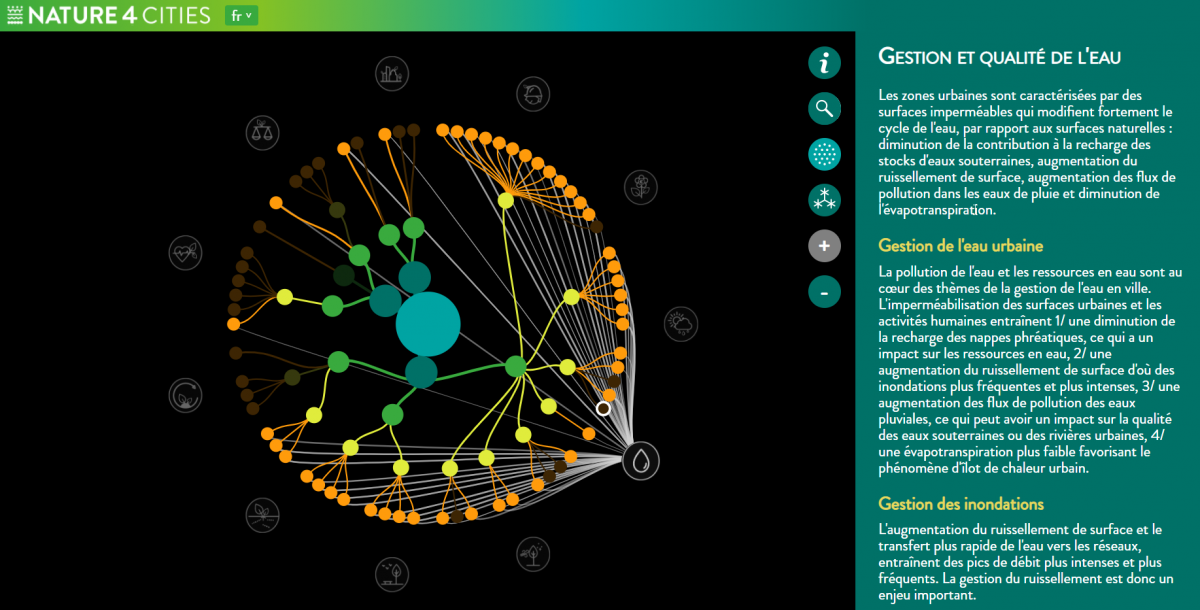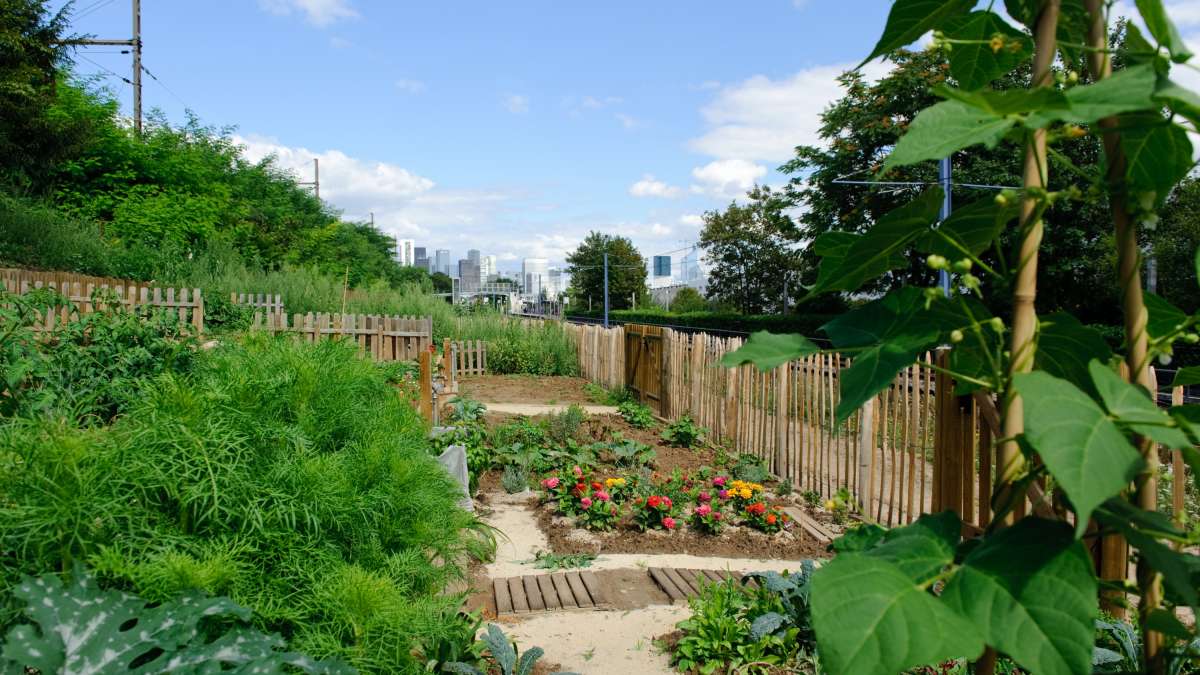

Nature-Based Solutions, which promote the development of living things, offer numerous benefits.
These solutions, inspired or supported by nature, respond to a strong citizen demand for nature in the city, contribute to climatic comfort in the city, to the attractiveness of a neighbourhood, they can provide resources, contribute to the local economy and play a social role.
They can be deployed at different scales, from city to building, contribute to a dynamic with the inhabitants, and are interconnected.
These Nature-Based Solutions developed in cities are urban agriculture projects, shared gardens, the development of green roofs, green streets, green and blue grids, developments promoting soil or shore permeability, the development of biodiversity, along with the preservation and integration of wetlands…
A database of solutions adapted to the context
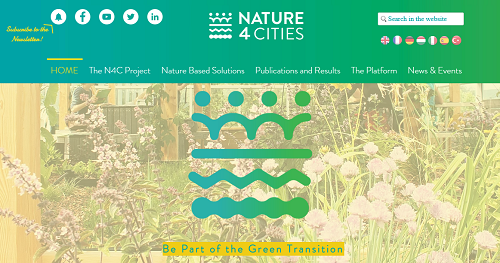
The Nature4Cities research project has several objectives:
-
To promote the integration of nature-based solutions in city planning,
-
To build an active and unique community network around nature-based solutions,
-
To offer a knowledge base of nature-based solutions and to promote the sharing of best practices,
-
To offer decision support tools to implement these solutions, along with new governance models.
-
Propose an assessment framework for nature-based solutions
The digital platform available on the website dedicated to the project is populated as the project progresses. Adapted to meet the needs of communities, businesses, experts and the general public, it already presents a knowledge base. Tools will soon be developed to support the development and implementation of nature-based solutions.
One important aspect of the Nature4Cities project is to promote solutions that are efficient and socially accepted, while being economically viable. A tool, Citizens Say, is being developed to support project carriers in their relations with citizens, to help them choose a mode of governance and interact with residents.
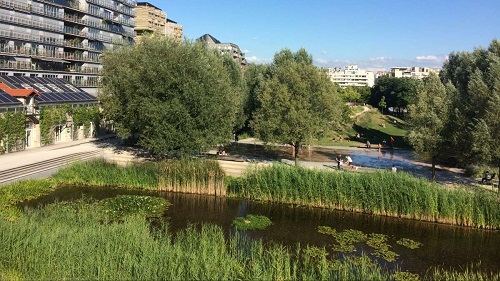
In December 2019, a seminar brought together the project participants and served to present the first tools of the platform. Marjorie Musy, scientific director of the project and researcher at Cerema, presented the scientific knowledge underpinning the project.
The work initially consisted in bringing together the multidisciplinary knowledge linked to the various Nature-Based Solutions in the city, in particular the implementation approaches and their impacts, in order to structure them. Performance and selection indicators were defined and transferred to a database of 57 Nature-Based Solutions and 98 pioneer projects, 31 of which are explained on the platform. The projects put forward can be replicated, and alternative projects can be proposed if the identified solution is not adapted to the context.
Tools were then developed to allow the various stakeholders to exploit this knowledge, to build a project for the implementation of Nature-Based Solutions and to evaluate it.
Tools for each stage of the project according to user profile
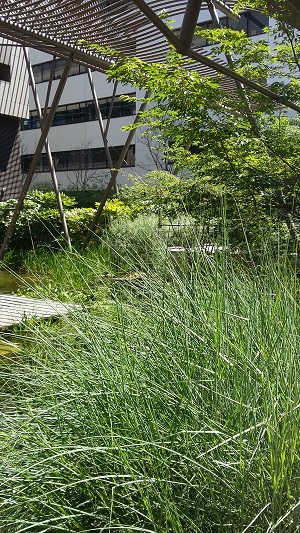 The platform aims to meet the needs of political decision-makers, professionals (urban planners, architects, construction…) to succeed in their Nature-Based Solution project, so that it ensures quality of life, is accepted, has a good cost-benefit ratio, and is well-located.
The platform aims to meet the needs of political decision-makers, professionals (urban planners, architects, construction…) to succeed in their Nature-Based Solution project, so that it ensures quality of life, is accepted, has a good cost-benefit ratio, and is well-located.
Among the tools already available:
-
GreenPass, which assesses the impact of Nature-Based Solutions on the urban environment,
-
Coloree Tool, used to analyse urban plots according to the possibility of implementing nature-based solutions,
-
Epesus, which uses big data to support decision-making in the circular economy,
-
NBenefit$, to financially and biophysically assess the ecosystem services of Nature-Based Solutions.
-
A step-by-step guide to making inclusive amenities that allow citizens to participate. A tool, EQoL scale, is used to assess residents' acceptance of projects.
-
A guide to designing and implementing Nature-Based Solutions projects based on case studies.
-
A database of models for implementing these solutions around the world, from which a dynamic tool is being produced.
-
The Nature-Based Solutions database, which is presented in the form of a dynamic rosette highlighting the interactions between the solutions, in connection with a series of practical sheets (see box below).
Other tools are being developed, for example to select the most suitable solutions according to the cultural, social and economic context, and to the needs necessary to develop the various solutions.
Other tools will be added, such as Geocluster4NBS, which will be used to pre-select, depending on local constraints, typical Nature-Based Solutions already implemented and to verify that they are adaptable elsewhere.


